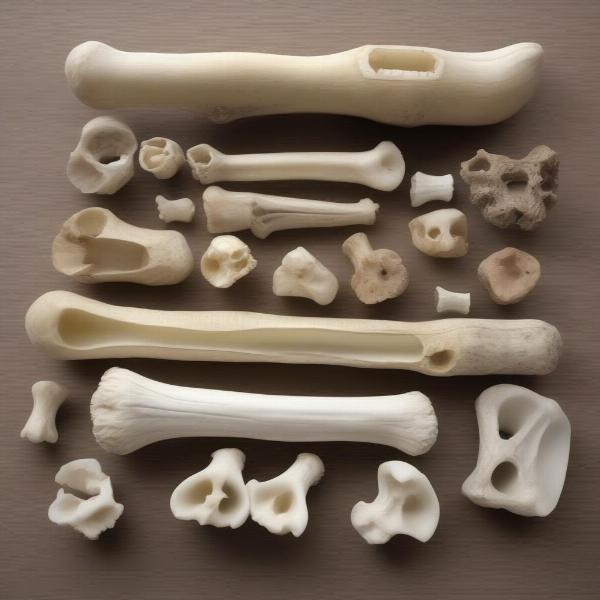Marrow bones for dogs have become a popular treat, lauded for their potential health benefits and long-lasting chew time. But are they truly a good choice for your furry friend? This comprehensive guide dives deep into the world of marrow bones for dogs, exploring their nutritional value, potential risks, and best practices for safe and enjoyable chewing. We’ll cover everything you need to know to make an informed decision about whether marrow bones are right for your canine companion.
The Nutritional Benefits of Marrow Bones for Dogs
Marrow itself is a nutrient-rich substance packed with essential fatty acids, vitamins, and minerals. These nutrients can contribute to a dog’s overall health by supporting healthy joints, boosting the immune system, and promoting healthy skin and coat. The act of chewing on a marrow bone also provides mental stimulation and helps to scrape away plaque and tartar, contributing to good dental hygiene.
Potential Risks of Marrow Bones for Dogs
While marrow bones offer several benefits, they also come with potential risks. One primary concern is the possibility of broken teeth, especially in aggressive chewers or dogs with pre-existing dental issues. Splintered bone fragments can also pose a choking hazard or cause digestive problems if swallowed. Additionally, overconsumption of marrow can lead to digestive upset, including diarrhea and vomiting. Raw marrow bones, in particular, carry the risk of bacterial contamination.
Choosing the Right Marrow Bones for Your Dog
If you decide to give your dog marrow bones, choosing the right type and size is crucial. Opt for raw marrow bones that have been properly cleaned and handled to minimize the risk of bacterial contamination. Avoid cooked bones, as they are more likely to splinter. Select a size appropriate for your dog’s breed and chewing habits. Smaller dogs should be given smaller bones to prevent choking. Supervise your dog closely while they are chewing on a marrow bone and remove it once it becomes small enough to be swallowed whole.
 Types of marrow bones for dogs
Types of marrow bones for dogs
Alternatives to Marrow Bones for Dogs
If you’re concerned about the potential risks of marrow bones, there are several safe and healthy alternatives. Dental chews designed to promote dental health and provide a satisfying chewing experience are readily available. dental chews for dogs with sensitive stomachs can be a good option for dogs with digestive issues. You can also offer your dog knuckle bones for dogs, which are generally denser and less likely to splinter. bones for little dogs are available specifically for smaller breeds.
How to Safely Give Your Dog Marrow Bones
Introduce marrow bones gradually to your dog’s diet and monitor their reaction. Offer the bone for short periods, initially, and always supervise the chewing session. Discard the bone once it becomes too small or worn down. Consider freezing the bone before giving it to your dog to prolong the chewing time and provide a cooling sensation, especially beneficial during hot weather. can dogs have beef marrow bones is a great resource for further information.
Conclusion: Are Marrow Bones a Good Choice for Your Dog?
Marrow bones can be a nutritious and enjoyable treat for dogs when given responsibly. are marrow bones good for dogs is a frequently asked question, and the answer depends on individual factors. By understanding the potential risks and following the safety guidelines outlined in this article, you can help ensure a positive and healthy chewing experience for your furry friend.
FAQ
- Can puppies have marrow bones? While puppies can benefit from the chewing action, it’s best to wait until they have their adult teeth before introducing marrow bones.
- How often should I give my dog a marrow bone? Marrow bones should be given as an occasional treat, not a regular part of your dog’s diet.
- What should I do if my dog breaks a tooth on a marrow bone? Contact your veterinarian immediately if your dog breaks a tooth or experiences any other injury related to chewing on a marrow bone.
- Can I give my dog cooked marrow bones? No, cooked bones are more likely to splinter and cause serious internal injuries.
- What are some signs of digestive upset in dogs? Vomiting, diarrhea, loss of appetite, and lethargy can all be signs of digestive upset.
- Are there any breeds that should avoid marrow bones? Dogs with aggressive chewing habits or pre-existing dental problems should generally avoid marrow bones.
- Where can I buy high-quality marrow bones for my dog? Look for raw, ethically sourced marrow bones from reputable butchers or pet supply stores.
About ILM Dog: ILM Dog is your trusted global resource for all things dog-related. We provide expert advice and practical tips on dog breeds, health, training, nutrition, grooming, and more. Whether you’re a new dog owner or a seasoned expert, ILM Dog is here to support you every step of the way. We specialize in providing valuable information on dog breeds and selection, health and medical care, training and behavior, as well as nutrition and feeding. For expert advice or to learn more about our services, contact us at [email protected] or call us at +44 20-3965-8624.